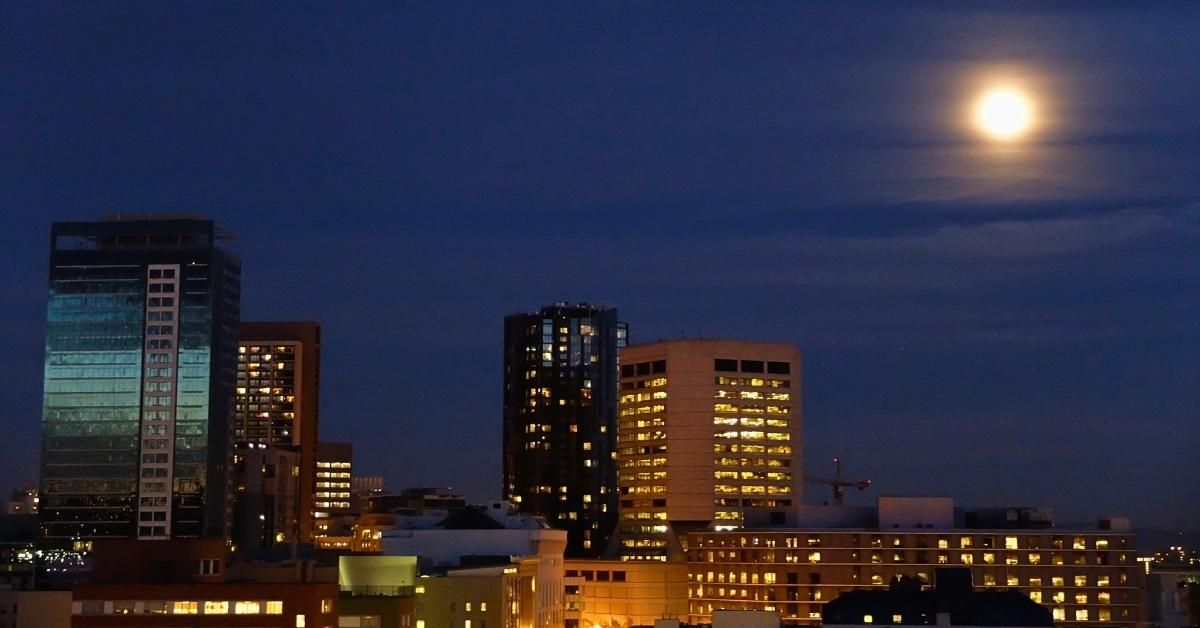
Full moon over San Francisco. Photo by Shundo David Haye.
By Tova Green
Each month at the full moon, the Beginner’s Mind Temple community gathers to renew our Bodhisattva vows. The next Beginner’s Mind Temple (City Center) Full Moon Ceremony will be on Wednesday, November 29. All are welcome.
The full moon ceremony performed at San Francisco Zen Center has its roots in the time before the Buddha. At the time of the historical Buddha, over twenty-five hundred years ago in India, full moons were recognized as days for religious practices. It was the Buddha’s friend King Bimbisara who suggested that the Buddha’s ordained disciples teach on full moon days so that lay people could learn from them. The Buddha agreed to King Bimbisara’s request and introduced two practices on full moon days — that monks recite the Patimokkha and that they teach the Dhamma to lay people.
Patimokkha refers to the monastic code of ethics and disciplinary rules. When the monastics gathered in their own assemblies for Patimokkha recitation, they first declared to the assembly if they had broken any monastic rules and resolved to refrain from doing so in the future. Today, monks and nuns throughout the world still recite their Patimokkha on full moon days.
When the Full Moon ceremony is held at City Center, participants form small groups before the formal part of the ceremony to reflect on how they have practiced with the precepts in the preceding month and to set intentions for the month ahead. Senior Dharma Teacher Paul Haller introduced this practice when he was Abbot.
Paul had experienced a version of the ceremony in Thailand, where he practiced in a Theravadin monastery. Each month at the full moon monks would gather, confess their wrong-doing, apologize, and ask for forgiveness. If it was a small transgression, such as getting angry with another monk, this might occur between the two monks. If it was a more serious transgression, a third monk might be asked to be present during the confession. If it were a very serious transgression, such as stealing something that belonged to the community, the monk might assemble three senior monks or the whole assembly and they would decide on the consequences. Paul noted, “It had a warm feeling to it. I might go to confess my anger and another monk would say, ‘I did that and it upset you.’ All my memories of it are very positive.”
Paul also added the practice of incensing a part of our robes before the ceremony, a purification practice. “In Thailand, you would wash your robe, shave your head, and do your repentance on full moon days.”
Sangha News Journal invited comments from residents of City Center about this practice:
Susan O’Connell wrote: “One of my favorite parts of the full moon ceremony is attending the small groups beforehand—particularly when they include people who are coming to the ceremony from the wider urban community. Each person talks about what precept they have been working with during the past month, and how it is going. It is so moving to see and hear the sincere practice that each person is engaging in. It is difficult to keep practice in the forefront even when one lives in a temple, all the more difficult for those who live in their own homes outside the temple container. The strength of people’s everyday practice sustains me until the next full moon gathering.”
Dana Velden commented, “The fact that this is one of the few practices we do that goes all the way back to the [time before the] Buddha connects me to our ancient roots and deepens my relationship to Buddhism. It also opens connections throughout space and time, and across borders and categories, as I imagine ancient Buddhas and monks living in Thailand and our City Center sangha all engaging in this practice together.
“Viewing my life and actions/responses through the lens of the precepts is very illuminating. Choosing just one precept, just one aperture, through which to consider my life clarifies and highlights things that I may have missed with my everyday framing. Sharing my practice with others on a broad spectrum of experience—we used to just count off and go with a random group which meant that there could be someone who was there for the first time sitting next to someone who has been practicing for 30 years. How rich and inspiring that was!”
Victoria Austin added, “Zazen tells the whole story of how to be human, and precepts help us realize the gift of our zazen practice moment by moment in everyday life. There is no gift more precious than this. Practice friends come together to get real with each other about our shortcomings in our shared life of vow. In the pure light of the full, round moon, we support each other to rededicate ourselves to the Way.”
As noted above, the next Beginners Mind Temple (City Center) Full Moon Ceremony will be on Wednesday, November 29. Everyone will gather at 7:30 pm in the Buddha Hall and then divide into small groups to discuss their practice of the Bodhisattva Precepts during the last month, framed by: Do no harm. Do good. Include everyone. After small groups, we will return to the Buddha Hall for the ceremony at 8:15 pm. The ceremony includes call-and-response chanting and several full bows.
Attendees are invited to dinner by donation at 6:30 pm before the ceremony; please register here if you plan to come to dinner.











